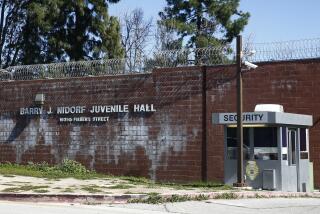Juvenile Halls Are on Notice
A kid doesn’t land in juvenile hall by singing off-key in the church choir. Crack dealing or carjacking is more like it. Still, even the most solid of citizens should be concerned that investigators for the Department of Justice found so many problems at Los Angeles County’s three juvies.
Two years ago, Justice Department investigators turned up a catalog of lousy conditions at Central, Los Padrinos and Barry J. Nidorf juvenile halls. On April 9, the inspectors delivered their report to the Board of Supervisors, alleging conditions so severe they violate the inmates’ constitutional protections.
Poor supervision, sloppy record-keeping and lax security were part of the problem. So were excessive force and haphazard medical attention. Staff members pepper-sprayed a girl while she was handcuffed and they diagnosed juveniles with medical conditions without a doctor’s review. The most serious failings, however, involved the lack of adequate mental health services.
The Justice Department inspectors found teenagers at risk for suicide in rooms without supervision or with live electrical outlets and objects from which they could hang themselves. Personnel treated one young woman with 16 drugs for a variety of mental problems but she still banged her head so often that investigators believed that the bruising had permanently discolored her forehead.
Staff members also failed to identify juveniles with mental retardation, and mental health assessments were hit-and-miss, with treatment even more so.
All of this must sound familiar to the significant number of teens who wind up in county foster care before or after their juvenile hall stays. Last month, local child welfare advocates and supervisors settled a lawsuit alleging that the county routinely denied foster children with serious mental and emotional deficits the treatment to which they were entitled. As a result of the suit, the Department of Children and Family Services says it’s providing better treatment.
Likewise, the county probation department officials who oversee the juvenile halls say they have been talking to the federal inspectors since the investigation and have made significant changes.
Juvenile hall staffers say they now do a mental health screening on 90% of the 16,000 youths booked into the halls each year. They’ve interspersed mental health staff with probation staff in the living units to intervene more quickly and are allocating more for the psychologists and psychiatrists who treat these inmates.
Still, there’s more to be done, and the public can’t afford to let officials shirk their responsibilities, even as federal and state funding for treatment and rehabilitation efforts shrinks. If properly managed, juvenile halls can help turn troubled youth into productive adults. They can also serve as criminal boot camps that only make bad kids worse.
More to Read
Sign up for Essential California
The most important California stories and recommendations in your inbox every morning.
You may occasionally receive promotional content from the Los Angeles Times.










